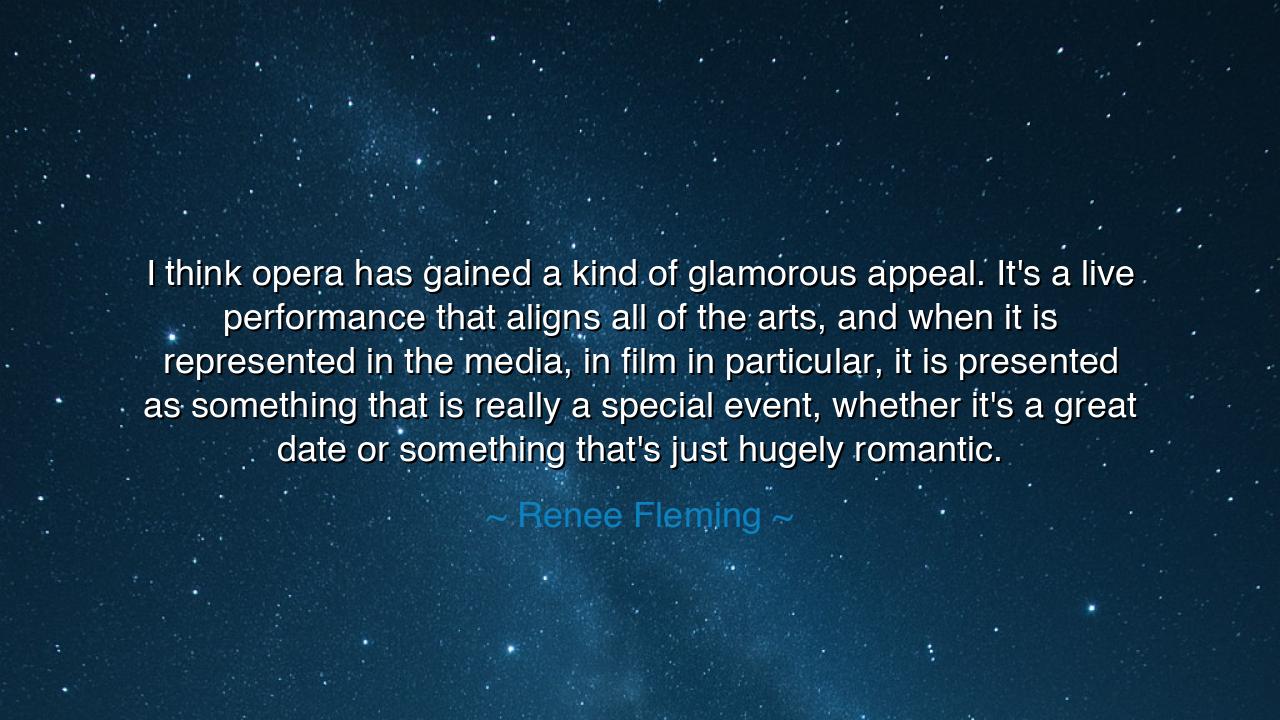
I think opera has gained a kind of glamorous appeal. It's a live
I think opera has gained a kind of glamorous appeal. It's a live performance that aligns all of the arts, and when it is represented in the media, in film in particular, it is presented as something that is really a special event, whether it's a great date or something that's just hugely romantic.






In the words of Renée Fleming, "I think opera has gained a kind of glamorous appeal. It's a live performance that aligns all of the arts, and when it is represented in the media, in film in particular, it is presented as something that is really a special event, whether it's a great date or something that's just hugely romantic," we encounter a deep reflection on the timelessness and transformative power of opera. Fleming highlights the unique ability of opera to unite various art forms—music, theater, dance, and visual art—into a single, intensely emotional experience. Her observation of opera’s portrayal as a glamorous event in media and film speaks to the way it has been idealized in culture as a powerful symbol of romance and high culture, often associated with grandeur and timeless beauty. Opera, then, is not just a form of musical expression but a cultural experience that elevates the soul and provides a platform for emotional connection on a level few other art forms can achieve.
The ancients understood the power of combining various forms of expression to create an elevated experience. In ancient Greece, theater was a central part of civic and cultural life, and Greek tragedies often incorporated music, dance, and poetry to communicate profound emotional truths. Figures like Aeschylus and Sophocles used the power of the stage to explore themes of fate, justice, and the divine, while Euripides introduced characters that embodied complex, deeply human emotions. The audience was not merely observing, but experiencing a catharsis, a cleansing or purging of emotions, through the intensity of these performances. Opera, like the great works of the Greeks, creates an emotional resonance by merging multiple art forms to deliver a unified experience of beauty and truth.
Similarly, in the Roman world, theater and performance held significant cultural and religious value. The grand spectacles of the Roman Empire, including gladiatorial combat and theatrical performances held in amphitheaters, were seen as not just forms of entertainment, but also as expressions of power, glory, and cultural supremacy. Much like modern opera, these performances were designed to captivate audiences and elicit strong emotional responses, whether through victory or tragedy. The Romans, like the Greeks, understood that when multiple artistic forms are combined, whether it be music, visual elements, or dramatic action, the emotional impact can be overwhelming, creating moments of intense connection between the performers and the audience. Opera, as Fleming notes, draws from this ancient tradition of creating an event that is more than just a performance—it's a cultural moment that touches the hearts and minds of those who experience it.
The romanticism of opera, as Fleming points out, is also a crucial element in its allure. Opera often deals with grand emotions—love, loss, vengeance, and joy—that resonate deeply with human experience. These intense emotions are amplified by the power of the voice, which, in the case of opera singers, can convey an almost divine expression of passion. Verdi, Puccini, and Wagner, for example, were masters of romantic opera, creating works that explored the depths of the human soul through music. In Puccini’s La Bohème, the love between Rodolfo and Mimi is not just a story of romance but a tragic journey through the beauty and pain of love. It is this sweeping emotion, this larger-than-life experience, that gives opera its reputation as a romantic and glamorous art form, and which is often highlighted in films, where opera performances are portrayed as the pinnacle of romance and sophistication.
In modern times, the allure of opera as a symbol of romance and refinement is often showcased in film, as Fleming suggests. In films like Pretty Woman or The Fifth Element, opera is used as a cultural shorthand for sophistication and emotional connection. In these films, the act of attending an opera performance is not just an aesthetic choice but a transformative experience for the characters. It’s in these moments that characters often find themselves confronting deep, raw emotions—whether it be love, fear, or self-discovery. The opera, in this sense, becomes a space where characters can engage with romance in its truest form—a passionate, elevated connection that is not just about individual feelings, but about humanity’s longing for connection, transcendence, and beauty. Opera, through its music and its visual splendor, offers a space for individuals to experience emotional catharsis, much like the ancient plays that captivated Greek and Roman audiences.
Fleming’s observation about opera also underscores the universal appeal of the art form. It speaks to the human need for stories that elevate and challenge us emotionally, that allow us to experience profound moments of beauty and truth. Opera is unique in the way it synthesizes multiple artistic elements—music, drama, and visual art—into one unified experience. In this way, it becomes more than just an evening’s entertainment; it is a cultural journey, a space for self-reflection, emotional release, and even romantic fulfillment. Opera, like the greatest works of art, reminds us that there is beauty in the world that transcends our everyday experience, a beauty that can transport us beyond ourselves into something greater.
The lesson in Fleming’s words, and in the tradition of opera itself, is one of depth and connection






AAdministratorAdministrator
Welcome, honored guests. Please leave a comment, we will respond soon